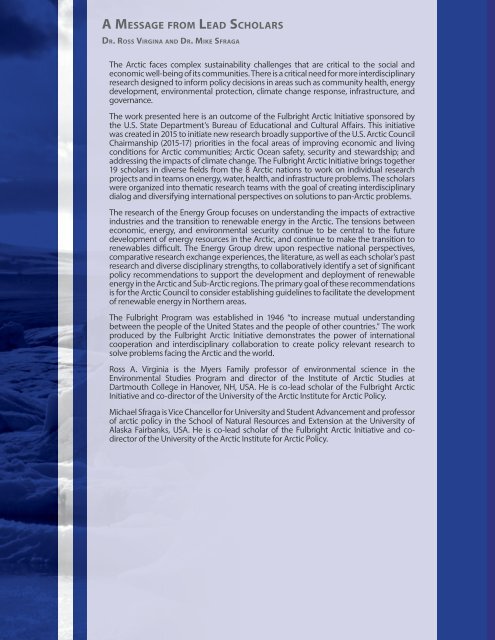DEVELOPING RENEWABLE ENERGY IN ARCTIC AND SUB-ARCTIC REGIONS AND COMMUNITIES
FulbrightArcRenewableEnergy
FulbrightArcRenewableEnergy
You also want an ePaper? Increase the reach of your titles
YUMPU automatically turns print PDFs into web optimized ePapers that Google loves.
A Message from Lead Scholars<br />
Dr. Ross Virgina and Dr. Mike Sfraga<br />
The Arctic faces complex sustainability challenges that are critical to the social and<br />
economic well-being of its communities. There is a critical need for more interdisciplinary<br />
research designed to inform policy decisions in areas such as community health, energy<br />
development, environmental protection, climate change response, infrastructure, and<br />
governance.<br />
The work presented here is an outcome of the Fulbright Arctic Initiative sponsored by<br />
the U.S. State Department’s Bureau of Educational and Cultural Affairs. This initiative<br />
was created in 2015 to initiate new research broadly supportive of the U.S. Arctic Council<br />
Chairmanship (2015-17) priorities in the focal areas of improving economic and living<br />
conditions for Arctic communities; Arctic Ocean safety, security and stewardship; and<br />
addressing the impacts of climate change. The Fulbright Arctic Initiative brings together<br />
19 scholars in diverse fields from the 8 Arctic nations to work on individual research<br />
projects and in teams on energy, water, health, and infrastructure problems. The scholars<br />
were organized into thematic research teams with the goal of creating interdisciplinary<br />
dialog and diversifying international perspectives on solutions to pan-Arctic problems.<br />
The research of the Energy Group focuses on understanding the impacts of extractive<br />
industries and the transition to renewable energy in the Arctic. The tensions between<br />
economic, energy, and environmental security continue to be central to the future<br />
development of energy resources in the Arctic, and continue to make the transition to<br />
renewables difficult. The Energy Group drew upon respective national perspectives,<br />
comparative research exchange experiences, the literature, as well as each scholar’s past<br />
research and diverse disciplinary strengths, to collaboratively identify a set of significant<br />
policy recommendations to support the development and deployment of renewable<br />
energy in the Arctic and Sub-Arctic regions. The primary goal of these recommendations<br />
is for the Arctic Council to consider establishing guidelines to facilitate the development<br />
of renewable energy in Northern areas.<br />
The Fulbright Program was established in 1946 “to increase mutual understanding<br />
between the people of the United States and the people of other countries.” The work<br />
produced by the Fulbright Arctic Initiative demonstrates the power of international<br />
cooperation and interdisciplinary collaboration to create policy relevant research to<br />
solve problems facing the Arctic and the world.<br />
Ross A. Virginia is the Myers Family professor of environmental science in the<br />
Environmental Studies Program and director of the Institute of Arctic Studies at<br />
Dartmouth College in Hanover, NH, USA. He is co-lead scholar of the Fulbright Arctic<br />
Initiative and co-director of the University of the Arctic Institute for Arctic Policy.<br />
Michael Sfraga is Vice Chancellor for University and Student Advancement and professor<br />
of arctic policy in the School of Natural Resources and Extension at the University of<br />
Alaska Fairbanks, USA. He is co-lead scholar of the Fulbright Arctic Initiative and codirector<br />
of the University of the Arctic Institute for Arctic Policy.


